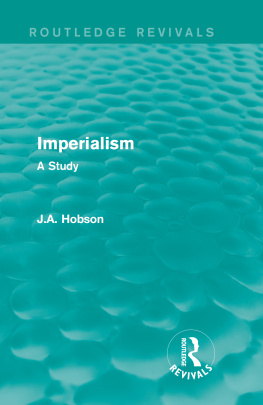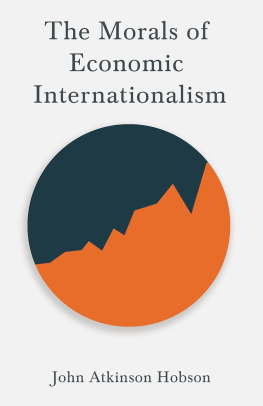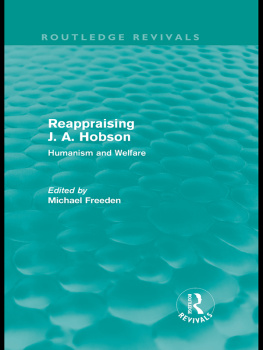Routledge Revivals
Free-thought in the Social Sciences
This Routledge Revival sees the reissue of a seminal work by British economist, sociologist and academic John A.Hobson, elucidating his views on a variety of topics, drawn from across the social sciences. He makes particular reference to the struggle between the disinterested urge of the social scientist and the interests and other motive forces which tend to influence and mould his processes of inquiry. The work is split into three parts, focussing upon free-thinking, economics and political ethics respectively.
Free-thought in the Social Sciences
J.A.Hobson
First published in 1926
by George Allen & Unwin Ltd
This edition first published in 2010 by Routledge
2 Park Square, Milton Park, Abingdon, Oxon, OX14 4RN
Simultaneously published in the USA and Canada
by Routledge
270 Madison Avenue, New York, NY 10016
Routledge is an imprint of the Taylor & Francis Group, an informa business
This edition published in the Taylor & Francis e-Library, 2010.
To purchase your own copy of this or any of Taylor & Francis or Routledges collection of thousands of eBooks please go to www.eBookstore.tandf.co.uk.
All rights reserved. No part of this book may be reprinted or reproduced or
utilised in any form or by any electronic, mechanical, or other means, now
known or hereafter invented, including photocopying and recording, or in any
information storage or retrieval system, without permission in writing from the
publishers.
Publishers Note
The publisher has gone to great lengths to ensure the quality of this reprint but
points out that some imperfections in the original copies may be apparent.
Disclaimer
The publisher has made every effort to trace copyright holders and welcomes
correspondence from those they have been unable to contact.
ISBN 0-203-85188-9 Master e-book ISBN
ISBN 13:978-0-415-57856-1 (hbk)
ISBN 13:978-0-203-85188-3 (ebk)
ISBN 10:0-415-57856-6 (hbk)
ISBN 10:0-203-85188-9 (ebk)
FREE-THOUGHT IN THE SOCIAL SCIENCES
FREE-THOUGHT IN THE SOCIAL SCIENCES
BY
J.A.HOBSON
AUTHOR OF ECONOMICS OF UNEMPLOYMENT
PROBLEMS OF A NEW WORLD, ETC.
LONDON: GEORGE ALLEN & UNWIN LTD.
RUSKIN HOUSE, 40 MUSEUM STREET, W.C.1
First published in 1926
This edition published in the Taylor & Francis e-Library, 2010.
To purchase your own copy of this or any of Taylor & Francis or Routledges collection of thousands of eBooks please go to www.eBookstore.tandf.co.uk.
(All rights reserved)
ISBN 0-203-85188-9 Master e-book ISBN
PREFACE
Just fifty-two years ago Herbert Spencer, in his Study of Sociology, introduced to the educated classes of this country the novel conception that social organisation could be material for scientific study, and that laws of evolution could be discovered in the history of human institutions. A most impressive aspect of this study was its presentation of the conflicts which a disinterested worker in this field of knowledge had to carry on with the biases of custom, interest and passion, which at every step tended to divert the mind from the path of reason.
Two generations have passed. In universities and other centres of culture certain branches of social science, especially economics, anthropology, politics and ethics, have won substantial recognition, while a general consent is accorded to the belief that the reign of law extends to all departments of human behaviour. But the rapid progress made in some of these studies, and their claim to the establishment of laws, with a rightful authority for the direction of the social arts, especially of industry and government, make it desirable that reconsideration should be given to the limits set upon the intellectual integrity and accuracy of thinking in these studies. Modern psychology has revealed many subtle ways in which emotional interests and valuations secretly, but powerfully, intervene in the processes of seemingly disinterested observation, reasoning and judgment. The soft material, the defects of language, the intrusion of traditional or popular ideas or generalisations, the complex and delicately qualitative interactions between the mind of the student and the object of his study, all contribute to make it difficult for any social science to attain, or even approach, the measure of accuracy, consistency and objective truth rightly claimed for the more advanced physical sciences.
Associated with, and part cause of, these difficulties of the social sciences is the wide and obscure penumbra of popular opinions and beliefs that encircle and infect them. The mathematician, the physicist, the chemist, even the biologist, is not seriously hampered by the loose thoughts, sentiments, or language of the man in the street, or even in the pulpit. But the idols of the cave and market are everywhere obtrusive in social studies, and often impose their images and terms in ways extremely detrimental to exact and disinterested thinking.
My object in this book is to examine afresh the character of this struggle between the disinterested urge of the social scientist and the interests and other motive forces which tend to influence and mould his processes of inquiry, reasoning and formulation, having regard to the peculiar nature of the subject matter which he handles.
I fully recognise that the treatment of this subject in my book fails to justify the claims of its ambitious title. Inadequacy of intellectual equipment, as well as limitations of time and space, have prevented me from attempting to give an equal and orderly consideration to the various branches of social science. After some general discussion of the character, methods and difficulties which distinguish all social studies, I pass on to examine the actual struggles for disinterested thinking, not in a comprehensive survey of the progress of the social sciences (a task beyond my competence), but by illustrative studies, chiefly in the field of political economy and politics. Though there are reasons for regarding the evolution of economic theory as a particularly valuable testing-ground for the conflict between disinterested science and the interests, I recognise that other fields, especially in anthropology and social psychology, deserve far more cultivation than is represented in the slight excursions I have made into them.
My main purpose has been, by disclosing the nature of the dangers to which the social sciences are exposed by the inherent difficulties of their material and method, taken in conjunction with the navet and self-assurance of many of their practitioners, to achieve two objects. The first is to afford some explanation of the slowness of these sciences in producing any considerable body of larger truths, in the shape of generally accepted laws and principles; the second is to show how the vindication of free-thought, with its accompanying increase of intellectual productivity in these studies, is linked up with definite reforms of social structure needed to liberate these studies from the hampering conditions which have hitherto cramped and malformed them.







